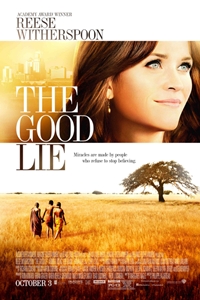 The Good Lie
The Good Lie
Starring Reese Witherspoon, Arnold Oceng, Ger Duany, Emmanuel Jal, Corey Stoll, and Kuoth Wiel
Directed by Philippe Falardeau
Rated PG-13
Run Time: 110 minutes
Genre: Drama
Opens October 3rd
By Eric Forthun of Cinematic Shadows
The Good Lie comes from the producer of The Blind Side, a similarly themed film focusing on an African-American football player from a troubled home going under the wing of a wealthy white woman. It was a tale that won Sandra Bullock an Oscar and made over $300 million worldwide, but it was ultimately a film about Bullock's character rather than a story that appropriately tackled race. The Good Lie becomes its own specimen of socially aware film, one driven by emotional power and independently-minded storytelling that makes it a special breed of major motion picture (particularly when it's advertised star Reese Witherspoon is non-existent for much of the film). Centering on the "Lost Boys of Sudan," the story starts in Sudan in the 1980s and focuses on a group of youngsters: Mamere (Arnold Oceng), Jeremiah (Ger Duany), Paul (Emmanuel Jal), Mamere's sister Abital (Kuoth Wiel), and Mamere's brother Theo (Femi Oguns). Facing the turmoil of a civil war in their home, they flee the country and aim to find refuge in a less volatile place.
Theo surrenders himself to armed militants to save the others' lives, so their trip takes them to a bordering country where they find hospice in a refugee camp. The first thirty minutes of the film is almost entirely subtitled and tells a harrowing story that feels too devastating to be fiction. That's because the film is based on the true story of these boys (and girl) and their journey to America, which doesn't happen until roughly ten years after their arrival in the camps. When they arrive in the United States, Abital gets separated and sent to Kansas City while the boys head to Boston, so they make it a mission to get her back. They are so hopelessly unfamiliar with everything that Americans have: they do not know what a running toilet is, they do not recognize why people throw away old food in the grocery store, and they do not understand formalities that Americans exchange when they don't mean something.
They are put under the supervision of Carrie Davis (Reese Witherspoon), a woman who helps people like Mamere and folk find jobs upon relocation. Carrie is an untidy, unhappy woman that has lost people close to her and doesn't connect herself with many around her, but there is something that strikes a spark in her about these boys. So she takes them under her wing and aims to guide them through their transition while giving them a sense of family that they lost a long time ago. The film casts itself in the aftermath of 9/11, allowing the story to comment on the struggle of travel and transportation at the time and the stagnation of the refugee program. While using that backdrop, it shows the different struggles each person faces upon their arrival: Paul is efficient at building things but falls into a web of drugs in his workplace; Mamere works at a grocery store but wants to get his sister and brother to Boston; and Jeremiah faces an issue of losing his ethnic identity in his workplace.
It's rare to see a studio film as politically charged and character driven as The Good Lie, which goes along with how refreshing and authentic everything within it feels. There's a sentimentality and kindness to its approach and the way it explores these Sudanese characters over any others; Witherspoon is an advertising piece that is good but not even close to the focal point of the story. The casting of actual Sudanese refugees makes the story feel lively and true to its nature. Philippe Falardeau's direction excels in delicacy and substance, even if there are very few moments that ring inauthentic; those few feel as if they are mocking the central characters and their obliviousness to the new world, but that might be the fish-out-of-water component. Mamere's story works wonders when, in its final moments, it explores the ways of American privilege and how it can be reversed and presented in a new, unforgettable way. The Good Lie skims the surface of the Sudanese refugees' hardships, but tells a good-natured, heartwarming story with compassion.









